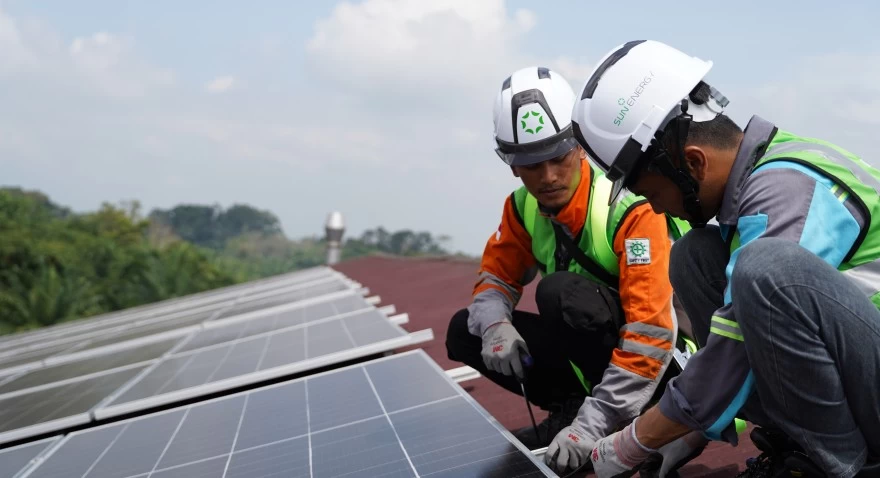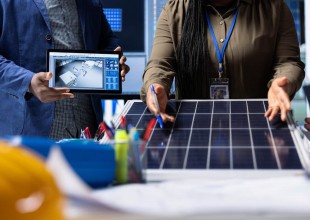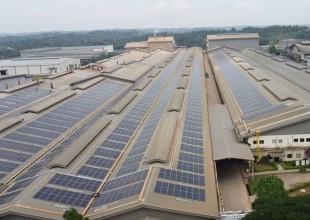How Solar Energy Systems Help Companies Strengthen Their ESG Value in the Eyes of Investors

Today, ESG (Environmental, Social, and Governance) factors have become a key focus in investment decisions. Global investors no longer assess companies solely based on financial performance but also on how they manage environmental impact, social contribution, and governance practices. According to the PwC Global Investor Survey, 79% of investors consider ESG factors as a crucial determinant in their investment decisions.
In Indonesia, a similar trend is emerging, marked by the growth of green financing and clean energy regulations. One of the most tangible ESG strategies is the adoption of solar energy systems. SUN Energy, Indonesia’s leading solar developer, has extensive experience in helping industrial and commercial companies adopt solar energy as part of their sustainability strategies.
Environment: Solar Energy as a Real Action to Reduce Emissions
The environmental aspect is the most critical pillar of ESG, and solar energy stands at the forefront of the clean energy transition. Unlike fossil fuel-based electricity, solar energy produces zero carbon emissions during operation. On average, every 1 MW of installed solar capacity can reduce approximately 1,000 tons of CO₂ per year, a strong foundation for companies to claim measurable contributions toward climate change mitigation.
Beyond environmental benefits, the financial aspect is equally compelling. According to the National Renewable Energy Laboratory (NREL), the cost of commercial rooftop solar energy systems has fallen by 69% since 2010, driven by advancements in panel efficiency and supporting technologies. This makes solar energy one of the most competitive renewable technologies available today. For investors, the combination of falling costs and emission reductions makes solar energy a low-risk, high-impact investment.
Social: Empowering Communities and Promoting Energy Inclusion
The implementation of solar energy systems also brings significant social benefits. Solar projects create green jobs across various sectors, from installation and construction to maintenance. Each large-scale project typically involves hundreds or even thousands of workers, many of whom come from local communities around the project site. This not only boosts income but also enhances skill development through technical training in renewable energy.
In remote areas, solar energy systems provide electricity access where it was previously unavailable. This access enables better education, healthcare, and the growth of microenterprises. Many corporations have also incorporated solar energy into their Corporate Social Responsibility (CSR) initiatives, for example, by installing solar systems in schools or rural healthcare facilities. This demonstrates that solar energy not only reduces carbon footprints but also delivers tangible social impact.
Governance: Transparency and Access to Green Financing
The third pillar of ESG, governance, relates to corporate management and transparency. Implementing solar energy systems is often a clear demonstration of a company’s commitment to regulatory compliance and transparency. With solar energy, companies can present verifiable data on renewable energy generation, the percentage of clean energy used, and the amount of carbon emissions reduced. This strengthens sustainability reporting and boosts investor confidence.
Moreover, good governance opens up access to financing opportunities. Many financial institutions now apply green financing principles, offering loans with competitive rates to environmentally responsible projects. Companies already using solar energy systems are better positioned to qualify for such funding, giving them a competitive advantage over those still dependent on fossil energy.
Global Trends and Indonesia’s Opportunity
From a macro perspective, global green investment trends are further reinforcing the role of solar energy. According to the World Economic Forum, global investment in renewable energy rose from USD 348 billion in 2020 to USD 499 billion in 2022. Based on data from the Institute for Energy Economics and Financial Analysis (IEEFA), Indonesia needs to attract USD 285 billion in total investment by 2030 to meet its climate targets, with USD 146 billion expected to come from the private sector. This highlights the vast potential for companies integrating solar energy systems into their business strategies.
Clean energy investment in Indonesia is also growing rapidly. In 2023, the value reached USD 498 million, up 78% from the previous year. This indicates that Indonesia’s market is aligning with global trends, where companies that demonstrate genuine sustainability action, such as solar energy adoption, are more likely to attract investors and long-term funding.
***
References:
- https://www.pwc.com/gx/en/corporate-reporting/assets/pwc-global-investor-survey-2021.pdf
- https://www.nrel.gov/news/detail/program/2021/documenting-a-decade-of-cost-declines-for-pv-systems
- https://www.weforum.org/stories/2023/10/irena-renewable-energy-jobs/
- https://ieefa.org/sites/default/files/2024-07/IEEFA%20Report%20-%20Unlocking%20Indonesia%27s%20renewable%20energy%20investment%20potential%20July2024.pdf
- https://en.wikipedia.org/wiki/Climate_finance_in_Indonesia


